The FTC Sues to Break Up Amazon Over an Economy-Wide "Hidden Tax"
"We have nowhere else to go and Amazon knows it." The FTC and states are going after Amazon, largely for stopping merchants from offering discounts elsewhere.
Welcome to BIG, a newsletter on the politics of monopoly power. If you’d like to sign up to receive issues over email, you can do so here.
Yesterday, the Federal Trade Commission and 17 states filed an antitrust suit against Amazon, one of the biggest companies in the world, for monopolization and unfair methods of competition. This piece is about what this case means, the government’s claims, and whether the legal arguments are strong.
There’s No Such Thing as “Free” Shipping
For almost 20 years, Amazon’s business has existed on a very strange premise that almost no one questions. Ostensibly, the retail firm is the lowest price option in the market, and it offers “free shipping” to over 100 million Amazon Prime customers, for which it charges a $139 a year membership fee. The revenue from Prime does not come close to covering the cost of its logistics arm, which was $85 billion in 2022. According to one J.P. Morgan analyst, the actual value of Prime is roughly $1,000 for a customer, which means that Amazon is subsidizing its Prime business to the tune of tens of billions of dollars a year. Where is this money coming from? To put it differently, how can Amazon be the lowest-cost retailer and offer free shipping, all while making money?
A lot of people have tried to argue that this is some grand technological feat, or business genius. But the answer, as it turns out, is that there is no such thing as a free lunch. Consumers pay for the free shipping, it’s just a hidden tax baked into the price of what you buy through an extraordinarily clever scheme put forward by Amazon. And that’s what the Federal Trade Commission and 17 states are suing over. This hidden tax is well-known in the industry. Here’s Mike Beckham, the CEO of Simple Modern and an exceptionally successful retailer, making that point in August.
Amazon Prime Is Bait
Most people think of Amazon as a retailer who sells to retail customers. But retail end users — you and me — aren’t really the customer. We are the product. And Amazon doesn’t really sell to us; it’s a middleman who sells access to us. The actual customers of Amazon are third-party businesses that rely on Amazon’s infrastructure to get their wares to the public.
In 2022, Amazon CEO Andy Jassy said this explicitly, “small and medium sized” sellers use Amazon not because of the “eCommerce software” Amazon provides but “because they get access to a few hundred million customers.” There are extremely high switching costs to move from one online superstore to another, so this is a business with significant barriers to entry.
Indeed, this barrier to entry is baked into the very structure of Amazon Prime and its free shipping, which was created, Jeff Bezos said, “to draw a moat around our best customers.” Here’s how the FTC complaint describes the allure of Prime, which is a bundle of services customers would prefer to order separately.
“This current restrictive structure of Prime reflects a deliberate strategy by Amazon to artificially increase barriers to entry and competition. As one former Amazon executive explained in recalling Amazon's motivation for adding non-shipping services to Prime, ‘[a]ny competitor might launch a Prime shipping clone, or they could potentially build a new Netflix-type service, but it was unlikely that any one of them would be able to do both.’”
Amazon’s strategy is to use Prime to build, extend, and fortify barriers to entry. One result of Prime is that Amazon now has an overwhelming monopoly share of online shoppers. And online shoppers aren’t the customer, but the product that Amazon brokers to third-party sellers, who must either pay Amazon what it demands or lose access to the market. As one seller put it, "We have nowhere else to go and Amazon knows it."
Once it achieved monopoly power, Amazon squeezed on price through fees to third-party sellers. As a third-party seller, you pay fees for listing on Amazon; for using Amazon’s warehouse services, known as Fulfillment by Amazon (FBA); and for advertising services. If you don’t pay, you don’t get put in a place on the site where consumers click. "Advertised products on Amazon,” reads the complaint, “are 46 times more likely to be clicked on when compared with products that are not advertised." And these fees have all increased steadily over the years.
At this point, the price Amazon charges these third party sellers has grown to nearly 50% of its revenue. It is this money, estimated at $123 billion in total last year, that pays for “free” shipping, as well as its video service, its music service, Twitch, and everything else that comes bundled with Prime. These third-party sellers in turn raise their prices to consumers, aka you and me, and then send that money back to Amazon in the form of fees. It’s basically money laundering.
This dynamic increasingly ruins the consumer experience. Amazon is now so full of pay-to-play ads that consumers are complaining they can’t find organic results, but are instead directed to higher priced items.
As the FTC noted, one “senior Amazon executive reportedly compared Amazon's advertising and search divisions to the parable of the scorpion and the frog: it was in the advertising division's nature as the proverbial ‘scorpion’ to poison organic search results."
The Anti-Discounting Algorithm
Still, why can’t a third-party seller offer a lower price outside of Amazon? Good question! That’s where the scheme gets very clever. Originally, Amazon imposed contracts, as the FTC noted, “barring all sellers from offering their goods for lower prices anywhere else.” But Europeans, and Senator Richard Blumenthal, complained about these price parity agreements, so Amazon dropped its explicit contractual requirements in 2019.
However, this change was a farce. The firm simply did through code what it couldn’t do through contract. "Amazon,” claims the FTC, “has implemented an algorithm for the express purpose of deterring other online stores from offering lower prices." Just weeks after dropping this requirement, Amazon wrote it would not change its policies, as California’s attorney general revealed in April. The firm even speculated that “media and selling partners may claim the removal of the clause was not only trivial but a trick and an attempt to garner goodwill with policymakers amid increasing competition concerns.”
Today, Amazon tells sellers that if it detects a lower price for their products on any other online store, they will be punished, which is to say, their ability to get their products onto a place on the Amazon website where customers click will go away. The net effect, as Amazon itself wrote, is that "prices will go up."
BIG is a reader-supported newsletter focused on the politics of monopoly and finance. If you haven't done so already, please consider upgrading to a paid subscription. After all, you can get lies for free, but in the end paying a few bucks for the truth is much cheaper.
Indeed, Amazon tells third-party sellers to raise prices. In 2019, a seller complained to Amazon that they were being asked “to take our prices down [on Amazon] to match our own [website] store.” Amazon’s VP of Pricing told the seller’s account manager that “[Y]ou might want to ask him to check if his sales on other sites directly or through distributors is putting him and us at a relative competitive disadvantage… He might get the hint. :)”
If this whole scheme sounds familiar, it’s because I described it in May of 2021 when then-D.C. Attorney General Karl Racine filed a similar though much less developed suit, in a piece called “Amazon Prime Is an Economy-Distorting Lie.” Racine left out some key details, and got a bad judge, so that case was dismissed, though it’s on appeal. California Attorney General Rob Bonta filed a very similar suit, which has survived important procedural elements and will go to trial. Another related suit, this one class action, in Washington state also passed a summary judgment.
The overall point is that Amazon is degrading the shopping experience, raising prices, and yet somehow still gaining market share. It is able to block third-party sellers from going elsewhere, and therefore also stop potential rivals from gaining share. It’s a fairly strong complaint, and while antitrust cases are always random, Bill Baer, the former Assistant Attorney General for Antitrust under the Obama administration, said it’s a strong argument. “If the FTC and states can prove even some of the factual allegations in this 172 page complaint,” he said, “Amazon is in a world of hurt.”
If this suit is resolved in the government’s favor, the remedy could be anything from ending anti-discounting measures to breaking up the firm. Regardless, there will be lower prices and discounting all over the web, and a lot of new firms will be able to enter the market. As one legal analyst told me last year, “Let's say a product today is sold for $10 on Amazon with 'free shipping'. If Amazon is forced to unbundle the FBA fee from the product price then it would cost $6 + $4 shipping. Prime makes no sense in this world unless Amazon again decided to subsidize Prime.” And even Amazon doesn’t have the tens of billions of dollars required to do that. Indeed, the stakes here are one reason that antitrust legend Bill Kovacic called the Amazon complaint “the most important case that the FTC has brought in its 109-year history.”
Secrecy and Project Nessie
One of the more disturbing trends in antitrust is how secretive courts have become on antitrust matters. I wrote this up on Sunday in my piece on how Judge Amit Mehta is hiding the Google trial, and the New York Times did a big story on the “unprecedented” secrecy of the trial, which does seem to have embarrassed Mehta. Journalists are getting increasingly angry over these redactions and closed sessions, because they want to write about stuff, and when you remove all the interesting tidbits it means they can’t. (The same journalists who cover the Google trial are also covering the Amazon complaint.)
Much of the interesting information in this Amazon complaint is redacted, including two particular elements I want to highlight. The first is that Amazon, like Google, has been destroying documents and internal conversations. The extent of their perfidy is not clear, since the paragraph alleging wrongdoing is redacted.
The second is something called Project Nessie, which is an algorithmic pricing system so egregious that the FTC determined that it deserved its own charge as an unfair method of competition. What is Project Nessie? I don’t know, since nearly all of the information about it is redacted. But it looks fascinating.
Fortunately, our work on the secrecy of the Google trial is paying dividends. Here’s FTC official Douglas Farrar arguing that the commission will push to get rid of the redactions:
We share the frustration that much of the data and quotes by Amazon executives in the complaint that describe what we allege is monopolistic and illegal behavior is redacted. Amazon has 14 days from the entry of a temporary sealing order to provide legitimate justification for preventing this information from being revealed. We do not believe that there are compelling reasons to keep much of this information secret from the public.
So there we go. This has been an extraordinary week, and it’s only Wednesday. As Axios reporter Ashley Gold put it:
Thanks for reading! Your tips make this newsletter what it is, so please send me tips on weird monopolies, stories I’ve missed, or other thoughts. And if you liked this issue of BIG, you can sign up here for more issues, a newsletter on how to restore fair commerce, innovation, and democracy. And consider becoming a paying subscriber to support this work, or if you are a paying subscriber, giving a gift subscription to a friend, colleague, or family member.
cheers,
Matt Stoller

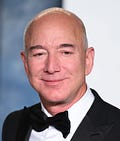

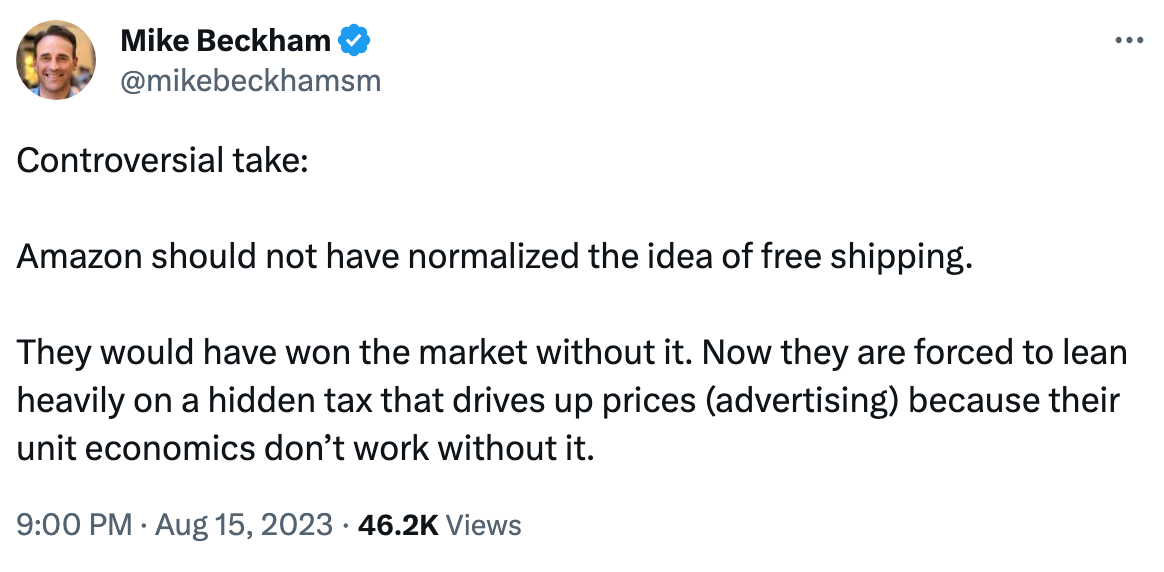
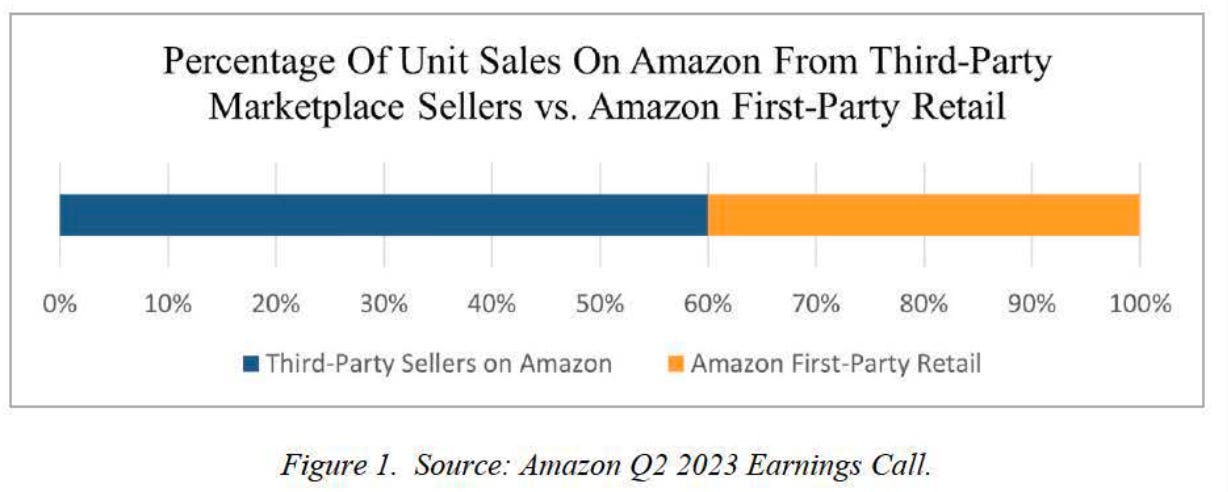
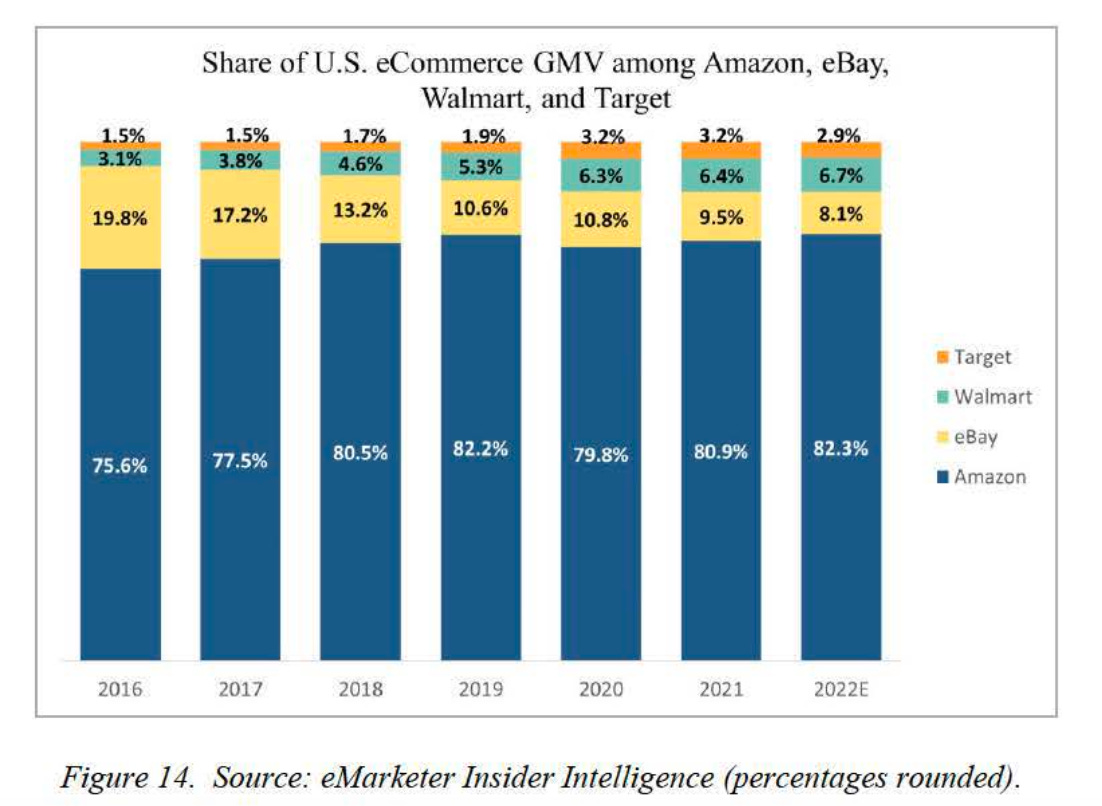
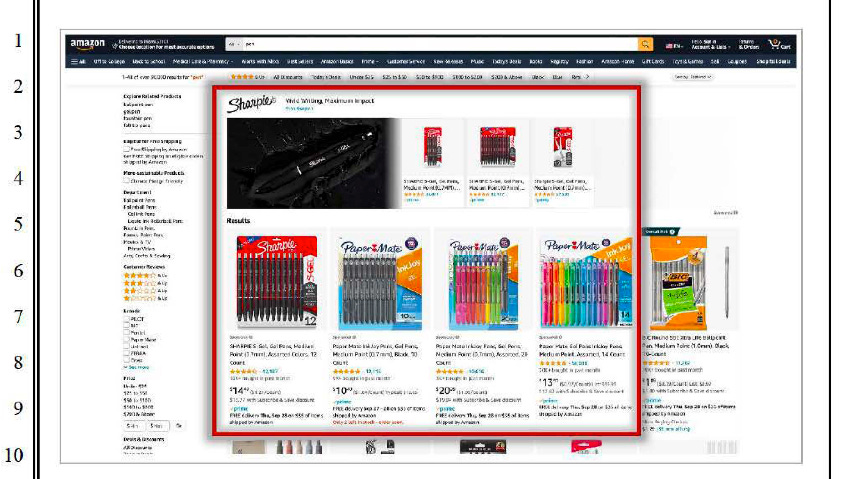
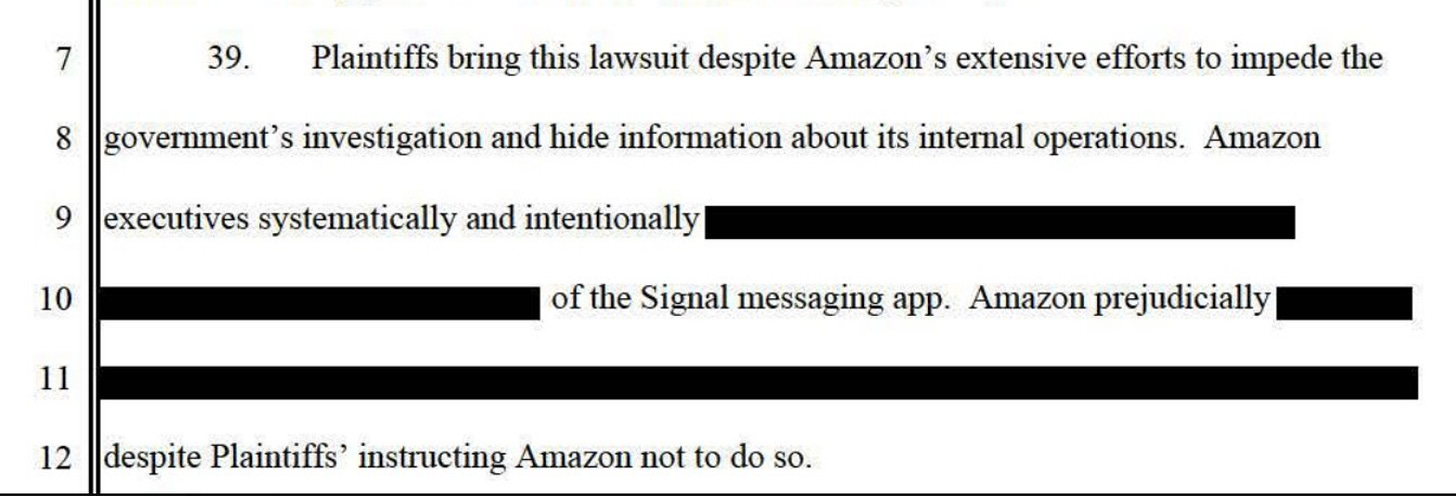
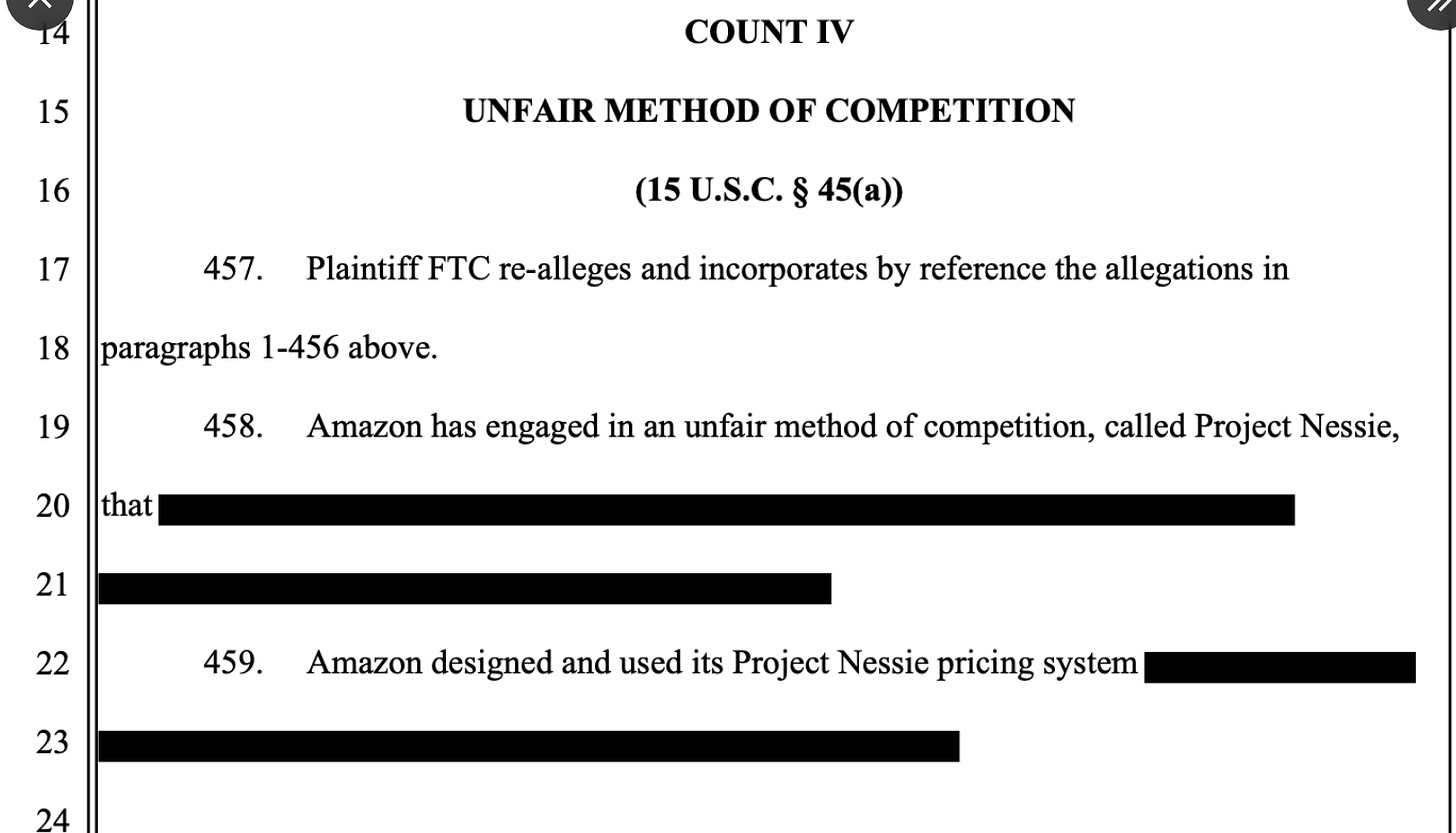
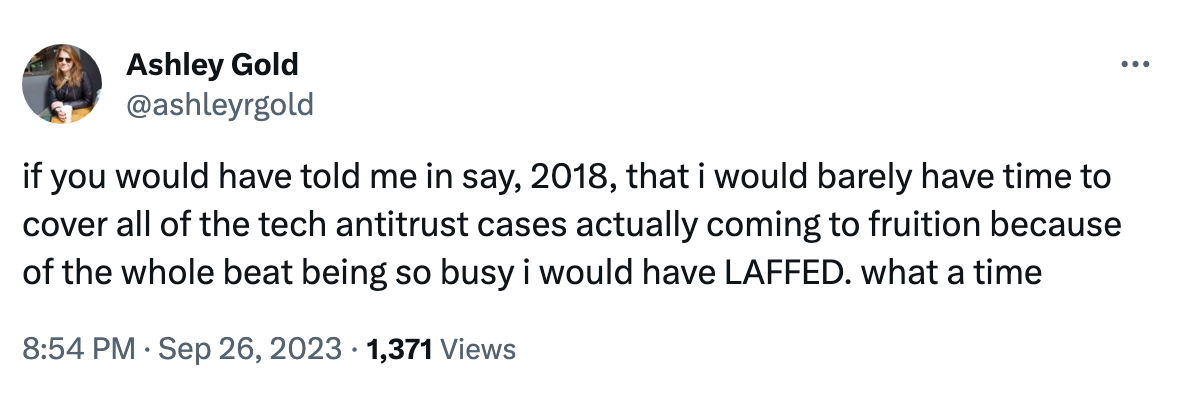
I heard, don't know if it's true, that France doesn't permit free shipping, since it destroys local businesses. Great idea-- supporting our neighbors is highly desirable. I'm so sick of these corporations bringing jobs to communities but siphoning all the profit away to Bentonville Arkansas or wherever. The local business, with its commitment to and support of its local community, including Little League sponsorships or whatever, is the ideal model.
Amazon is breaking itself up: the prices are too high now! And I did find the items (1/2) cheaper elsewhere. This is mainly for food, where sellers add on a hidden shipping fee. It's just not a deal to buy anything there anymore (in bulk).
And also, they are parading too much never-heard-of Chinese mom-n-pop brand stuff. The whole marketplace is littered with this junk.